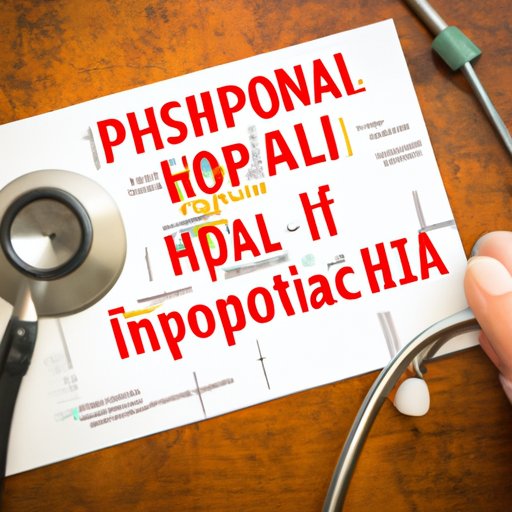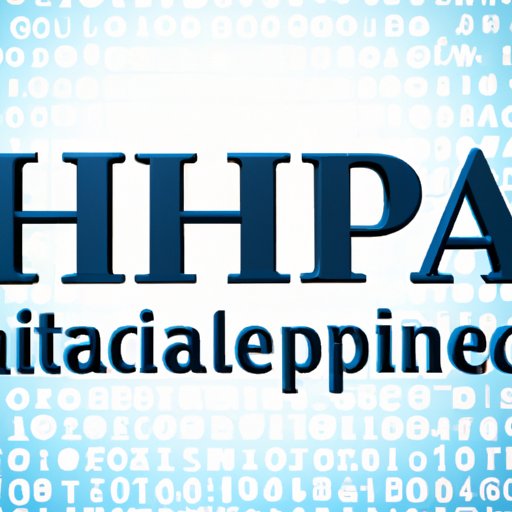Introduction
The Health Insurance Portability and Accountability Act (HIPAA) was passed in 1996 to protect individuals’ privacy and security of their healthcare data. HIPAA governs how healthcare organizations handle and use individuals’ protected health information (PHI) to ensure that their privacy is maintained and their data is secure. However, since the initial implementation of HIPAA, there have been several modifications made by the federal government to strengthen healthcare privacy and security. This article aims to delve into the federal law changes made to HIPAA, why they were made, and how they have impacted individuals and healthcare organizations.

Breaking Down the HIPAA Modifications: Understanding the Changes Made by the Federal Law
Substantive modifications to HIPAA refer to significant changes made to the Act that affect privacy and security standards for healthcare data. Several laws have been passed over the years to modify HIPAA, including the American Recovery and Reinvestment Act (ARRA) in 2009, the Affordable Care Act in 2010, and the 21st Century Cures Act in 2016.
Some of the most significant modifications made to HIPAA include:
- Expanding the scope of HIPAA to cover business associates like healthcare vendors, suppliers, and contractors
- Implementing breach notification requirements for covered entities and their business associates
- Strengthening enforcement of HIPAA regulations through greater penalties and fines for non-compliance
These changes were made to address the evolving nature of healthcare data and the potential risks posed by data breaches and other cyber threats. They were designed to provide greater privacy and security protection for individuals and to ensure better accountability for healthcare organizations and their business associates.
HIPAA Evolution: How the Federal Government Has Revised the Act to Better Protect Your Health Information
HIPAA has undergone significant revisions since its initial implementation in 1996. The Act was originally intended to make healthcare more accessible to individuals, regardless of their health status or employment status. However, HIPAA has been modified over the years to address emerging privacy and security concerns in healthcare.
The major revisions made to HIPAA since its inception include:
- The HIPAA Privacy Rule (2003) which established national standards for how individuals’ health information is used, disclosed, and protected
- The HIPAA Security Rule (2005) which specified the mandatory security measures that covered entities and business associates must implement to protect ePHI (electronic protected health information)
- The HITECH Act (2009) which strengthened HIPAA enforcement with greater penalties and fines, expanded the HIPAA Privacy and Security Rules, and introduced new breach notification requirements for healthcare organizations and their business associates
The most recent revision to HIPAA involves the 21st Century Cures Act (2016) which requires healthcare providers to give patients access to their medical records in a digital format. The Act also aims to reduce administrative burdens on providers while still maintaining security and privacy standards for healthcare data.
Your Privacy Matters: Analyzing the Significant Changes Made by Federal Law to HIPAA Regulations
The modifications made by federal law have had significant implications for both healthcare organizations and patients.
For healthcare organizations, they must now take precautions to ensure that their business associates are also compliant with HIPAA regulations since they are also liable for violations. Healthcare organizations must enforce stricter security measures to prevent breaches, and they must have incident response plans in place to mitigate the impact of any breaches that do occur.
For patients, the modifications made to HIPAA ensure greater privacy and security of their health information. The breach notification requirements implemented through HIPAA modifications enable patients to know when their information has been compromised, allowing them to take proactive measures to protect themselves. Patients also have greater control over their medical records and can access them more easily.
Overall, the modifications made to HIPAA have strengthened privacy and security standards for healthcare data and have provided greater accountability for healthcare organizations.
From HIPAA to HIPAA – A History of Substantive Modifications to One of the Nation’s Most Critical Healthcare Laws
Each federal modification made to HIPAA has built upon the previous ones to provide stronger protections for healthcare data. Future modifications of HIPAA are likely to continue to focus on digital technology and data security.
It is essential that healthcare organizations and their business associates remain informed and up-to-date on these modifications to ensure that they remain compliant with HIPAA regulations. By taking proactive measures, healthcare organizations can mitigate risks and ensure that they are effectively protecting individuals’ healthcare data.
Navigating the Complexities: Examining the Impact of Federal Law Changes to HIPAA Compliance for Healthcare Providers
Healthcare providers must take several steps to remain compliant with HIPAA regulations. These steps include:
- Conducting regular risk assessments to identify potential security threats and vulnerabilities
- Implementing strict access control measures to prevent unauthorized access to ePHI
- Ensuring that all business associates are also compliant with HIPAA regulations
- Providing HIPAA training for employees and ensuring that they understand their role in protecting healthcare data
By taking these steps, healthcare providers can ensure that they are effectively protecting individuals’ healthcare data and that they are compliant with HIPAA regulations.
Reinforcing HIPAA Protections: A Comprehensive Guide to Understanding Federal Revision Made to the Act
The most recent modifications made by the federal government to HIPAA regulations include:
- Updates to the HIPAA Privacy and Security Rules to account for changes in healthcare technology and the growing use of electronic health records
- Introduction of the 21st Century Cures Act which requires healthcare providers to give patients access to their medical records and reduces administrative burdens on providers
Individuals can protect their own health information by being proactive about their healthcare data and following guidelines for data security, such as creating strong passwords and being cautious when sharing information online.
These modifications to HIPAA fit into the larger context of healthcare privacy and data security. By providing stronger protections for healthcare data, individuals can feel more comfortable sharing their information and healthcare organizations can be more effective in providing quality care for their patients.
Why the HIPAA Revamp Matters: A Deep Dive into the Federal Law Reforms and Their Implications for Healthcare Organizations and Patients
The modifications made by the federal government to HIPAA regulations have significantly impacted healthcare privacy and security. Healthcare organizations are now more accountable for protecting individuals’ healthcare data, and patients have greater control over their medical records.
It is essential that healthcare organizations and individuals remain informed and up-to-date on these modifications to ensure effective compliance and protection. By working together, healthcare organizations and patients can continue to strengthen healthcare privacy and security for all individuals.
Conclusion
HIPAA has undergone significant modifications over the years to address emerging privacy and security concerns in healthcare. The most recent modifications made by federal law have strengthened privacy and security standards for healthcare data and have provided greater accountability for healthcare organizations and their business associates. It is essential that healthcare providers and individuals stay informed and up-to-date on these modifications to ensure effective compliance and protection of health information.
Protecting healthcare data is a vital component of providing quality care to patients. By taking proactive measures to ensure effective compliance, healthcare providers can mitigate risks and enable better healthcare outcomes for all individuals.
